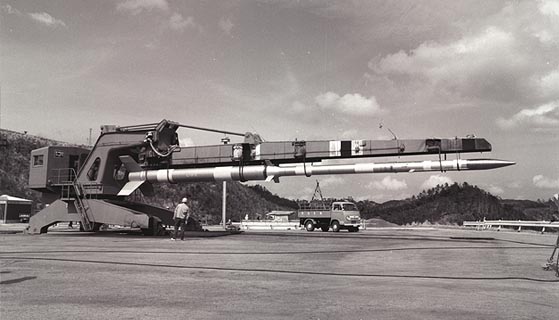We aim at your deep understanding of the space development of Japan.

The 1960s

|
「Three rockets, the "Sigma rocket", the "Lambda rocket", and the "Mu rocket", were developed in the 1960s.」 |
|---|

|
「It is an uncanny smart name.
Much more than Robotann 」 |
|---|

|
「...」 |
|---|

|
「You should stop insulting his name. 」 |
|---|

|
「It was a joke. 」 |
|---|

|
「Now, they will introduce.」 |
|---|

|
「I will introduce the "Sigma rocket" first.
This succeeded the Alpha rocket introduced the some point, and it was developed. Moreover, it was the final form of the Rockoon technology currently used for the Baby rocket or the Alpha rocket. 」 |
|---|

|
「What is a rockoon?」 |
|---|

|
「It is the technology which launches a rocket.
After going up to a certain amount of height using a balloon, a rocket is launched from there. 」 |
|---|

|
「Why is it called the rockoon? 」 |
|---|

|
「It is the abbreviation of a "Rocket balloon". 」 |
|---|

|
「It is a cute name.」 |
|---|

(c)JAXA

|
「Next,I will introduce the "Lambda rocket".
This rocket succeeded the Kappa rocket. 」 |
|---|

|
「Both of the rockets made in the 1950s were succeeded. 」 |
|---|

|
「That's right.
Most materials in body of the Lambda rocket are carried out based on the technology of a Kappa rocket. 」 |
|---|

|
「Is the purpose are together even if it succeeds?」 |
|---|

|
「The purpose in a "Sigma rocket" is earth observation.
However, in this "Lambda rocket", it is a launch of an artificial satellite. 」 |
|---|

|
「Is the artificial satellite already launched 50 years ago!? 」 |
|---|

|
「No, No. 5 launched in 1970 made it successful for the first time. 」 |
|---|

| 「I see.」 |
|---|

| 「However, it was still 40 years ago.
It is great. 」 |
|---|

|
「Finally, I will talk about the "Mu rocket".
It as Japanese original solid fuel rocket series following the pencil, the Baby, the Kappa, and the Lambda.」 |
|---|

|
「Solid fuel rocket?
Is there any rocket with liquid fuel? 」 |
|---|

|
「No, fuel is the difference about a solid or a liquid. 」 |
|---|

|
「I understand.
I was a little surprised. 」 |
|---|

|
「This Mu rocket retirement life in 2006. 」 |
|---|

|
「It is these days. 」 |
|---|

| 「That is great. 」 |
|---|

|
「It launched no less than 26 sets of scientific satellites, and contributed to the development of space science in the world. 」 |
|---|

|
「It is uncanny that it is still being used wowadays, even though it was made so long ago.」 |
|---|

| 「I respect as a scientist. 」 |
|---|

